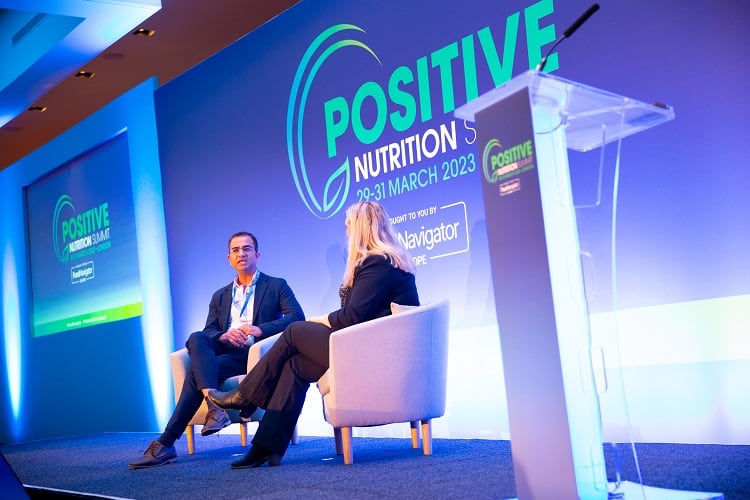In October 2021, PepsiCo unveiled its pep+ (pep positive) strategy to drive ‘end-to-end transformation’ of its business. Its focus lies in ‘doing the right thing’ for people and planet, and as Rakesh Sharma, R&D Director, Europe Sustainability and NWE (north-west Europe) Foods explains, nutrition sits at the heart of that strategy.
Less than 18 months on, and PepsiCo is shaking up its portfolio with reformulation, innovation, and ‘positive nutrition’ efforts, FoodNavigator hears.
A 'positive nutrition' approach
“We are concentrating our efforts to transform the food system so that it becomes more sustainable, regenerative, and inclusive. And nutrition is very much at the heart of it,” explained Sharma at FoodNavigator’s recent Positive Nutrition Summit in London.
The company aims to achieve this objective by expanding its range of ‘positive choice’ products – those which are both good for people as well as the planet. PepsiCo is developing its ‘positive choice’ portfolio in two key ways: via reformulation and innovation, and through ‘positive nutrition’.
For PepsiCo, pulling that latter lever means incorporating diverse ingredients into its product portfolio where possible.
Since the global COVID-19 pandemic, the beverage-to-snacks giant has observed greater demand for healthy, nutritious ingredients. “Consumers are more conscious of making healthier choices. They’re looking for ingredients that provide nutritional benefits,” said Sharma.
In working to meet consumer demand, with both people and planet in mind, PepsiCo is prioritising the inclusion of chickpeas, plant proteins, and whole grains.
Legumes, in particular, fit that ‘people and planet’ piece, he continued, since not only are they a source of protein, fibre and minerals, but they have nitrogen-fixing capabilities which helps reduce artificial fertiliser use and cut overall carbon emissions.
Where will PepsiCo incorporate these ingredients? Sharma rightly explained the company’s portfolio is ‘much more diverse’ than ‘just fizzy drink and chips’.
“We have food products that contain ingredients such as whole grain, fruit and veg, nuts and seeds, and we also have a complementary range of beverages, such as water and unsweetened tea – which provide hydration, without the calories.”
Cutting fat, salt and sugar
As to PepsiCo’s reformulation and innovation efforts, the company is focused on reducing saturated fat and sodium from its snacks, and sugar from its beverages.
This in itself is nothing new. The company has been focusing on reducing saturated fat, sodium and sugar from its portfolio ‘for years’. In the UK, PepsiCo has managed to reduce the saturated fat content in its crisps by switching to ‘healthier’ oils in the cooking process. And globally, the company has already achieved its goal of having 75% of its portfolio contain less than 1.1g of saturated fat per 100 kcal. “We achieved that in 2021, four years ahead of [target],” explained Rakesh.
In Europe, the company has also achieved its sugar and salt reduction objectives, so has stepped up its ambition to cut the average level of added sugars in its soft drinks by 50% and build a $1bn portfolio of snack products rated B or better on the Nutri-Score scale by 2030.

Recent reformulation efforts include the launch of non-HFSS flavour variants within its Walkers snacks and Snack a Jacks ranges, including a line of Walkers crisps containing 45% less sodium in the UK. The company has already received ‘good feedback’ from consumers on the reduced sodium product. “It’s one of the good performing innovations from last year, we’re seeing good uplift from those products,” Sharma explained.
PepsiCo has also renovated its Walkers Baked range of snacks to be HFSS compliant in the UK. “It’s doing very well,” Sharma revealed, “Now we’re hoping to expand that across other markets in Europe as well.”
'Healthier options' via reformulation and innovation
Another way PepsiCo is innovating in its ‘positive choices’ portfolio is by developing ‘healthier options’. In the UK, PepsiCo has committed to having 50% of its sales coming from either non-HFSS or lower calorie products by 2025, and the company is investing £35m (€39m) over the next three years to get there.
To break down that objective, the company plans to have around 30% of its portfolio non-HFSS, and 20% lower calorie – meaning that some snacks will be sold in smaller pack sizes at 100 kcal or lower per serving.
Today (2 May), PepsiCo is announcing that 30% of its 30% of Walkers sales now come from 'healthier' snacks: non-HFSS snacks account for 15% of Walkers' overall sales, and portions of 100 kcal or less account for a further 15% of sales.
These reformulation and innovation efforts stem from PepsiCo’s belief that a change of behaviour at industry level will drive change in behaviour amongst consumers. That change can occur with either consumers consciously selecting the healthier option, or doing so unknowingly.
In practice, that means that for some brands and products, PepsiCo will make it clear a product is ‘healthier’ on pack. And for others, particularly within its core brand range, the company will take a more ‘health by stealth’ approach – whereby products are made healthier without making overt claims on-pack.
“It’s about taking consumers with us on some products, but then also providing those healthier options for the consumers looking for that as well,” explained Sharma at the event.
Ultimately, PepsiCo is convinced it can have an impact on consumers’ diets in a ‘positive way’.
“If we look ahead to the future, we believe that our iconic global brands will continue to play a role in driving positive change with the scale and reach that we have, inspiring people to make positive choices, and choose products that are good for people and planet.”



